Fleurs du Mal Magazine


Or see the index
.jpg)
Novalis
(Friedrich von Hardenberg, 1772–1802)
Hymnen an die Nacht 5
Über der Menschen weitverbreitete Stämme herrschte vor Zeiten ein eisernes Schicksal mit stummer Gewalt. Eine dunkle, schwere Binde lag um ihre bange Seele – Unendlich war die Erde – der Götter Aufenthalt, und ihre Heymath. Seit Ewigkeiten stand ihr geheimnißvoller Bau. Ueber des Morgens rothen Bergen, in des Meeres heiligem Schooß wohnte die Sonne, das allzündende, lebendige Licht.
Ein alter Riese trug die selige Welt. Fest unter Bergen lagen die Ursöhne der Mutter Erde. Ohnmächtig in ihrer zerstörenden Wuth gegen das neue herrliche Göttergeschlecht und dessen Verwandten, die fröhlichen Menschen. Des Meers dunkle, grüne Tiefe war einer Göttin Schooß. In den krystallenen Grotten schwelgte ein üppiges Volk. Flüsse, Bäume, Blumen und Thiere hatten menschlichen Sinn. Süßer schmeckte der Wein von sichtbarer Jugendfülle geschenkt – ein Gott in den Trauben – eine liebende, mütterliche Göttin, empor wachsend in vollen goldenen Garben – der Liebe heilger Rausch ein süßer Dienst der schönsten Götterfrau – ein ewig buntes Fest der Himmelskinder und der Erdbewohner rauschte das Leben, wie ein Frühling, durch die Jahrhunderte hin – Alle Ge schlechter verehrten kindlich die zarte, tausendfältige Flamme, als das höchste der Welt. Ein Gedanke nur war es, Ein entsetzliches Traumbild,
Das furchtbar zu den frohen Tischen trat
Und das Gemüth in wilde Schrecken hüllte.
Hier wußten selbst die Götter keinen Rath
Der die beklommne Brust mit Trost erfüllte.
Geheimnißvoll war dieses Unholds Pfad
Des Wuth kein Flehn und keine Gabe stillte;
Es war der Tod, der dieses Lustgelag
Mit Angst und Schmerz und Thränen unterbrach.
Auf ewig nun von allem abgeschieden,
Was hier das Herz in süßer Wollust regt,
Getrennt von den Geliebten, die hienieden
Vergebne Sehnsucht, langes Weh bewegt,
Schien matter Traum dem Todten nur beschieden,
Ohnmächtiges Ringen nur ihm auferlegt.
Zerbrochen war die Woge des Genusses
Am Felsen des unendlichen Verdrusses.
Mit kühnem Geist und hoher Sinnenglut
Verschönte sich der Mensch die grause Larve,
Ein sanfter Jüngling löscht das Licht und ruht –
Sanft wird das Ende, wie ein Wehn der Harfe.
Erinnerung schmilzt in kühler Schattenflut,
So sang das Lied dem traurigen Bedarfe.
Doch unenträthselt blieb die ewge Nacht,
Das ernste Zeichen einer fernen Macht.
Zu Ende neigte die alte Welt sich. Des jungen Geschlechts Lustgarten verwelkte – hinauf in den freyeren, wüsten Raum strebten die unkindlichen, wachsenden Menschen. Die Götter verschwanden mit ihrem Gefolge – Einsam und leblos stand die Natur. Mit eiserner Kette band sie die dürre Zahl und das strenge Maaß. Wie in Staub und Lüfte zerfiel in dunkle Worte die unermeßliche Blüthe des Lebens. Entflohn war der beschwörende Glauben, und die allverwandelnde, allverschwisternde Himmelsgenossin, die Fantasie. Unfreundlich blies ein kalter Nordwind über die erstarrte Flur, und die erstarrte Wunderheymath verflog in den Aether. Des Himmels Fernen füllten mit leuchtenden Welten sich. Ins tiefre Heiligthum, in des Gemüths höhern Raum zog mit ihren Mächten die Seele der Welt – zu walten dort bis zum Anbruch der tagenden Weltherrlichkeit. Nicht mehr war das Licht der Götter Aufenthalt und himmlisches Zeichen – den Schleyer der Nacht warfen sie über sich. Die Nacht ward der Offenbarungen mächtiger Schoos – in ihn kehrten die Götter zurück – schlummerten ein, um in neuen herrlichern Gestalten auszugehn über die veränderte Welt. Im Volk, das vor allen verachtet zu früh reif und der seligen Unschuld der Jugend trotzig fremd geworden war, erschien mit niegesehenem Angesicht die neue Welt – In der Armuth dichterischer Hütte – Ein Sohn der ersten Jungfrau und Mutter – Geheimnißvoller Umarmung unendliche Frucht. Des Morgenlands ahndende, blüt[h]enreiche Weisheit erkannte zuerst der neuen Zeit Beginn – Zu des Königs demüthiger Wiege wies ihr ein Stern den Weg. In der weiten Zukunft Namen huldigten sie ihm mit Glanz und Duft, den höchsten Wundern der Natur. Einsam entfaltete das himmlische Herz sich zu einem Blüthenkelch allmächtger Liebe – des Vaters hohem Antlitz zugewandt und ruhend an dem ahndungsselgen Busen der lieblich ernsten Mutter. Mit vergötternder Inbrunst schaute das weissagende Auge des blühenden Kindes auf die Tage der Zukunft, nach seinen Geliebten, den Sprossen seines Götterstamms, unbekümmert über seiner Tage irdisches Schicksal. Bald sammelten die kindlichsten Gemüther von inniger Liebe wundersam ergriffen sich um ihn her. Wie Blumen keimte ein neues fremdes Leben in seiner Nähe. Unerschöpfliche Worte und der Botschaften fröhlichste fielen wie Funken eines göttlichen Geistes von seinen freundlichen Lippen. Von ferner Küste, unter Hellas heiterm Himmel geboren, kam ein Sänger nach Palästina und ergab sein ganzes Herz dem Wunderkinde:
Der Jüngling bist du, der seit langer Zeit
Auf unsern Gräbern steht in tiefen Sinnen;
Ein tröstlich Zeichen in der Dunkelheit –
Der höhern Menschheit freudiges Beginnen.
Was uns gesenkt in tiefe Traurigkeit
Zieht uns mit süßer Sehnsucht nun von hinnen.
Im Tode ward das ewge Leben kund,
Du bist der Tod und machst uns erst gesund.
Der Sänger zog voll Freudigkeit nach Indostan – das Herz von süßer Liebe trunken; und schüttete in feurigen Gesängen es unter jenem milden Himmel aus, daß tausend Herzen sich zu ihm neigten, und die fröhliche Botschaft tausendzweigig emporwuchs. Bald nach des Sängers Abschied ward das köstliche Leben ein Opfer des menschlichen tiefen Verfalls – Er starb in jungen Jahren, weggerissen von der geliebten Welt, von der weinenden Mutter und seinen zagenden Freunden. Der unsäglichen Leiden dunkeln Kelch leerte der liebliche Mund – In entsetzlicher Angst nahte die Stunde der Geburt der neuen Welt. Hart rang er mit des alten Todes Schrecken – Schwer lag der Druck der alten Welt auf ihm. Noch einmal sah er freundlich nach der Mutter – da kam der ewigen Liebe lösende Hand – und er entschlief.
Nur wenig Tage hing ein tiefer Schleyer über das brausende Meer, über das bebende Land – unzählige Thränen weinten die Geliebten – Entsiegelt ward das Geheimniß – himmlische Geister hoben den uralten Stein vom dunkeln Grabe. Engel saßen bey dem Schlummernden – aus seinen Träumen zartgebildet – Erwacht in neuer Götterherrlichkeit erstieg er die Höhe der neugebornen Welt – begrub mit eigner Hand der Alten Leichnam in die verlaßne Höhle, und legte mit allmächtiger Hand den Stein, den keine Macht erhebt, darauf.
Noch weinen deine Lieben Thränen der Freude, Thränen der Rührung und des unendlichen Danks an deinem Grabe – sehn dich noch immer, freudig erschreckt, auferstehn – und sich mit dir; sehn dich weinen mit süßer Inbrunst an der Mutter seligem Busen, ernst mit den Freunden wandeln, Worte sagen, wie vom Baum des Lebens gebrochen; sehen dich eilen mit voller Sehnsucht in des Vaters Arm, bringend die junge Menschheit, und der goldnen Zukunft unversieglichen Becher. Die Mutter eilte bald dir nach – in himmlischem Triumf – Sie war die Erste in der neuen Heymath bey dir. Lange Zeiten entflossen seitdem, und in immer höherm Glanze regte deine neue Schöpfung sich – und tausende zogen aus Schmerzen und Qualen, voll Glauben und Sehnsucht und Treue dir nach – wallen mit dir und der himmlischen Jungfrau im Reiche der Liebe – dienen im Tempel des himmlischen Todes und sind in Ewigkeit dein.
Gehoben ist der Stein –
Die Menschheit ist erstanden –
Wir alle bleiben dein
Und fühlen keine Banden.
Der herbste Kummer fleucht
Vor deiner goldnen Schaale,
Wenn Erd und Leben weicht
Im letzten Abendmahle.
Zur Hochzeit ruft der Tod –
Die Lampen brennen helle –
Die Jungfraun sind zur Stelle –
Um Oel ist keine Noth –
Erklänge doch die Ferne
Von deinem Zuge schon,
Und ruften uns die Sterne
Mit Menschenzung’ und Ton.
Nach dir, Maria, heben
Schon tausend Herzen sich.
In diesem Schattenleben
Verlangten sie nur dich.
Sie hoffen zu genesen
Mit ahndungsvoller Lust –
Drückst du sie, heilges Wesen,
An deine treue Brust.
So manche, die sich glühend
In bittrer Qual verzehrt
Und dieser Welt entfliehend
Nach dir sich hingekehrt;
Die hülfreich uns erschienen
In mancher Noth und Pein –
Wir kommen nun zu ihnen
Um ewig da zu seyn.
Nun weint an keinem Grabe,
Für Schmerz, wer liebend glaubt,
Der Liebe süße Habe
Wird keinem nicht geraubt –
Die Sehnsucht ihm zu lindern,
Begeistert ihn die Nacht –
Von treuen Himmelskindern
Wird ihm sein Herz bewacht.
Getrost, das Leben schreitet
Zum ewgen Leben hin;
Von innrer Glut geweitet
Verklärt sich unser Sinn.
Die Sternwelt wird zerfließen
Zum goldnen Lebenswein,
Wir werden sie genießen
Und lichte Sterne seyn.
Die Lieb’ ist frey gegeben,
Und keine Trennung mehr.
Es wogt das volle Leben
Wie ein unendlich Meer.
Nur Eine Nacht der Wonne –
Ein ewiges Gedicht –
Und unser aller Sonne
Ist Gottes Angesicht.
.jpg)
Novalis poetry
fleursdumal.nl magazine
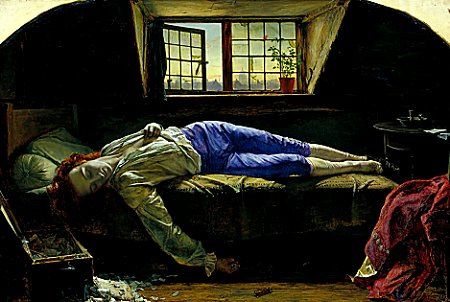
Thomas Chatterton
(1752-1770)
Song from Ælla
SING unto my roundelay,
O drop the briny tear with me;
Dance no more at holyday,
Like a running river be:
My love is dead,
Gone to his death-bed
All under the willow-tree.
Black his cryne [1] as the winter night,
White his rode [2] as the summer snow,
Red his face as the morning light,
Cole he lies in the grave below:
My love is dead,
Gone to his death-bed
All under the willow-tree.
Sweet his tongue as the throstle’s note,
Quick in dance as thought can be,
Deft his tabor, cudgel stout;
O he lies by the willow-tree!
My love is dead,
Gone to his death-bed
All under the willow-tree.
Hark! the raven flaps his wing
In the brier’d dell below;
Hark! the death-owl loud doth sing
To the nightmares, as they go:
My love is dead,
Gone to his death-bed
All under the willow-tree.
See! the white moon shines on high;
Whiter is my true-love’s shroud:
Whiter than the morning sky,
Whiter than the evening cloud:
My love is dead,
Gone to his death-bed
All under the willow-tree.
Here upon my true-love’s grave
Shall the barren flowers be laid;
Not one holy saint to save
All the coldness of a maid:
My love is dead,
Gone to his death-bed
All under the willow-tree.
With my hands I’ll dent the briers
Round his holy corse to gre [3]:
Ouph [4] and fairy, light your fires,
Here my body still shall be:
My love is dead,
Gone to his death-bed
All under the willow-tree.
Come, with acorn-cup and thorn,
Drain my heartès blood away;
Life and all its good I scorn,
Dance by night, or feast by day:
My love is dead,
Gone to his death-bed
All under the willow-tree.
1 cryne – hair – 2 rode – complexion – 3 gre – grow – 4 ouph – elf
Thomas Chatterton poetry
fleursdumal.nl magazine
More in: Archive C-D, Chatterton, Thomas, Thomas Chatterton
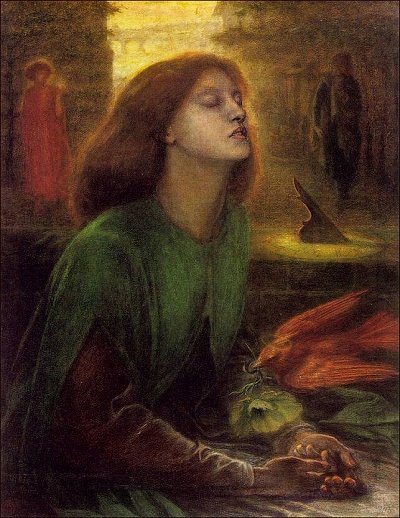
Elizabeth (Lizzie) Siddal
(1829-1862)
The Lust of the Eyes
I care not for my Lady’s soul
Though I worship before her smile;
I care not where be my Lady’s goal
When her beauty shall lose its wile.
Low sit I down at my Lady’s feet
Gazing through her wild eyes
Smiling to think how my love will fleet
When their starlike beauty dies.
I care not if my Lady pray
To our Father which is in Heaven
But for joy my heart’s quick pulses play
For to me her love is given.
Then who shall close my Lady’s eyes
And who shall fold her hands?
Will any hearken if she cries
Up to the unknown lands?
Elizabeth (Lizzie) Siddal poems
fleursdumal.nl magazine for art & literature
More in: Archive S-T, Lizzy Siddal, Siddal, Lizzy
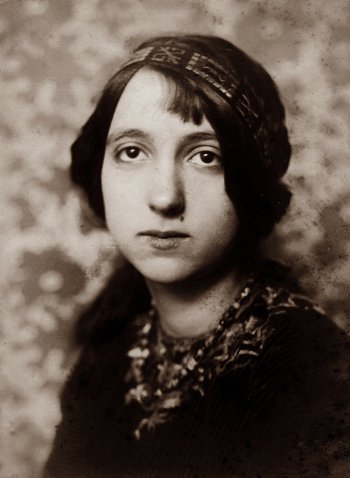
Mireille Havet
(1898-1932)
Sur un tableau cubiste
Et mon rêve s’est penché sur le tableau cubiste
Harmonieux comme lui il a pris la forme profonde
de ses courbes.
Plus rien
Mon rêve oublie le monde, il s’enfonce et l’espace entier
fait place à ma pensée.
Les choses ne sont plus… Ah ! qu’importe les CHOSES
comme un arc-en-ciel, elles se décomposent
Prisme d’idée
Prisme de sensation
Réalisation enfin nouvelle d’une beauté simplifiée
comprise et universelle.
Vie simple
Sonorité sans limite
lumière ronde de ces lignes et s’emboîtant dans elle
comme des poupées russes.
Oh ! je vois des choses…
non! des lumières… le Paradis quand il était
situé dans le ciel devait avoir de ces profondeurs :
morceau de clarté jaillissante me faisant penser
à une tasse de porcelaine blanche au milieu d’un
crépuscule printanier.
Ombre divinement infinie
Ombre où l’on tombe comme une âme après la mort
doit tomber dans l’éternité.
Et mon rêve et moi-même sont entrés dans ces formes,
tels des pierres dans une maison neuve
Ne m’appelez plus maintenant, ne me demandez
plus rien de la vie : je pars — je suis partie
navire lointain sur la mer sans fin
On ne rappelle pas un navire. On ne rappelle pas
une pensée
et combien de sifflets, ce soir, annoncent des départs
auxquels vous ne songez.
Mireille Havet: Sur un tableau cubiste (‘ La culture physique ‘ de Picabia, exposée aux Indépendants en 1914)
Mireille Havet poetry
fleursdumal.nl magazine
More in: Archive G-H, Havet, Mireille, Mireille Havet
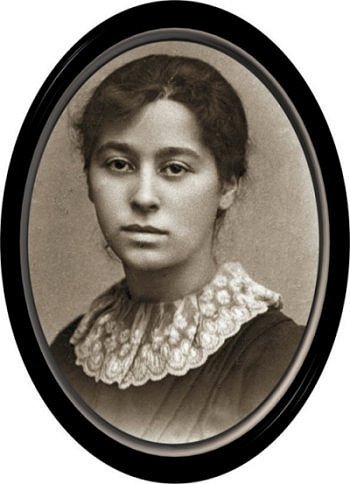
Amy Levy
(1861-1889)
Christopher Found
I
At last; so this is you, my dear!
How should I guess to find you here?
So long, so long, I sought in vain
In many cities, many lands,
With straining eyes and groping hands;
The people marvelled at my pain.
They said: “But sure, the woman’s mad;
What ails her, we should like to know,
That she should be so wan and sad,
And silent through the revels go?”
They clacked with such a sorry stir!
Was I to tell? were they to know
That I had lost you, Christopher?
Will you forgive me for one thing?
Whiles, when a stranger came my way,
My heart would beat and I would say :
” Here’s Christopher!” –then lingering
With longer gaze, would turn away
Cold, sick at heart. My dear, I know
You will forgive me for this thing.
It is so very long ago
Since I have seen your face–till now;
Now that I see it–lip and brow,
Eyes, nostril, chin, alive and clear;
Last time was long ago; I know
This thing you will forgive me, dear.
II
There is no Heaven–This is the best;
O hold me closer to your breast;
Let your face lean upon my face,
That there no longer shall be space
Between our lips, between our eyes.
I feel your bosom’s fall and rise.
O hold me near and yet more near;
Ah sweet ; I wonder do you know
How lone and cold, how sad and drear,
Was I a little while ago;
Sick of the stress, the strife, the stir;
But I have found you, Christopher.
III
If only you had come before!
(This is the thing I most deplore)
A seemlier woman you had found,
More calm, by courtesies more bound,
Less quick to greet you, more subdued
Of appetite; of slower mood.
But ah! you come so late, so late!
This time of day I can’t pretend
With slight, sweet things to satiate
The hunger-cravings. Nay, my friend,
I cannot blush and turn and tremble,
Wax loth as younger maidens do.
Ah, Christopher, with you, with you,
You would not wish me to dissemble?
IV
So long have all the days been meagre,
With empty platter, empty cup,
No meats nor sweets to do me pleasure,
That if I crave–is it over-eager,
The deepest draught, the fullest measure,
The beaker to the brim poured up?
V
Shelley, that sprite from the spheres above,
Says, and would make the matter clear,
That love divided is larger love;–
We’ll leave those things to the bards, my dear.
For you never wrote a verse, you see;
And I–my verse is not fair nor new.
Till the world be dead, you shall love but me,
Till the stars have ceased, I shall love but you.
EPILOGUE
Thus ran the words; or rather, thus did run
Their purport. Idly seeking in the chest
(You see it yonder), I had found them there:
Some blotted sheets of paper in a case,
With a woman’s name writ on it: “Adelaide.”
Twice on the writing there was scored the date
Of ten years back; and where the words had end
Was left a space, a dash, a half-writ word,
As tho’ the writer minded, presently
The matter to pursue.
I questioned her,
That worthy, worthy soul, my châtelaine,
Who, nothing loth, made answer.
There had been
Another lodger ere I had the rooms,
Three months gone by–a woman.
“Young, sir ? No.
Must have seen forty if she’d seen a day!
A lonesome woman; hadn’t many friends;
Wrote books, I think, and things for newspapers.
Short in her temper–eyes would flash and flame
At times, till I was frightened. Paid her rent
Most regular, like a lady.
Ten years back,
They say (at least Ann Brown says), ten years back
The lady had a lover. Even then
She must have been no chicken.
Three months since
She died. Well, well, the Lord is kind and just.
I did my best to tend her, yet indeed
It’s bad for trade to have a lodger die.
Her brother came, a week before she died:
Buried her, took her things, threw in the fire
The littered heaps of paper.
Yes, the sheets,
They must have been forgotten in the chest;–
I never knew her name was Adelaide.”
Amy Levy poetry
fleursdumal.nl magazine
More in: Amy Levy, Archive K-L, Levy, Amy

Elizabeth (Lizzie) Siddal
(1829-1862)
Love and Hate
Ope not thy lips, thou foolish one,
Nor turn to me thy face;
The blasts of heaven shall strike thee down
Ere I will give thee grace.
Take thou thy shadow from my path,
Nor turn to me and pray;
The wild wild winds thy dirge may sing
Ere I will bid thee stay.
Turn thou away thy false dark eyes,
Nor gaze upon my face;
Great love I bore thee: now great hate
Sits grimly in its place.
All changes pass me like a dream,
I neither sing nor pray;
And thou art like the poisonous tree
That stole my life away.
Elizabeth (Lizzie) Siddal poems
fleursdumal.nl magazine
More in: Archive S-T, Lizzy Siddal, Siddal, Lizzy
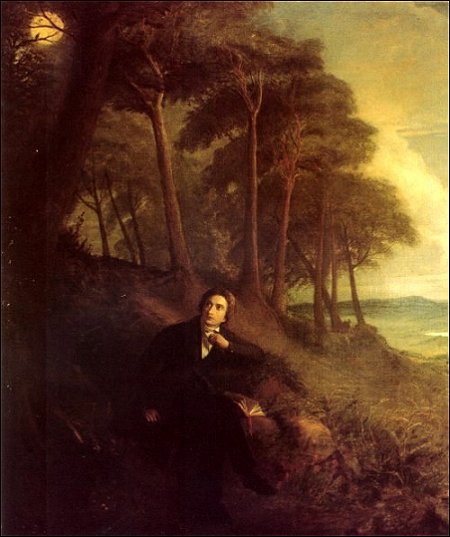
John Keats
(1795–1821)
Ode to a nightingale
My heart aches, and a drowsy numbness pains
My sense, as though of hemlock I had drunk,
Or emptied some dull opiate to the drains
One minute past, and Lethe-wards had sunk:
‘Tis not through envy of thy happy lot,
But being too happy in thine happiness,–
That thou, light-winged Dryad of the trees,
In some melodious plot
Of beechen green, and shadows numberless,
Singest of summer in full-throated ease.
O, for a draught of vintage! that hath been
Cool’d a long age in the deep-delved earth,
Tasting of Flora and the country green,
Dance, and Provençal song, and sunburnt mirth!
O for a beaker full of the warm South,
Full of the true, the blushful Hippocrene,
With beaded bubbles winking at the brim,
And purple-stained mouth;
That I might drink, and leave the world unseen,
And with thee fade away into the forest dim:
Fade far away, dissolve, and quite forget
What thou among the leaves hast never known,
The weariness, the fever, and the fret
Here, where men sit and hear each other groan;
Where palsy shakes a few, sad, last gray hairs,
Where youth grows pale, and spectre-thin, and dies;
Where but to think is to be full of sorrow
And leaden-eyed despairs,
Where Beauty cannot keep her lustrous eyes,
Or new Love pine at them beyond to-morrow.
Away! away! for I will fly to thee,
Not charioted by Bacchus and his pards,
But on the viewless wings of Poesy,
Though the dull brain perplexes and retards:
Already with thee! tender is the night,
And haply the Queen-Moon is on her throne,
Cluster’d around by all her starry Fays;
But here there is no light,
Save what from heaven is with the breezes blown
Through verdurous glooms and winding mossy ways.
I cannot see what flowers are at my feet,
Nor what soft incense hangs upon the boughs,
But, in embalmed darkness, guess each sweet
Wherewith the seasonable month endows
The grass, the thicket, and the fruit-tree wild;
White hawthorn, and the pastoral eglantine;
Fast fading violets cover’d up in leaves;
And mid-May’s eldest child,
The coming musk-rose, full of dewy wine,
The murmurous haunt of flies on summer eves.
Darkling I listen; and, for many a time
I have been half in love with easeful Death,
Call’d him soft names in many a mused rhyme,
To take into the air my quiet breath;
Now more than ever seems it rich to die,
To cease upon the midnight with no pain,
While thou art pouring forth thy soul abroad
In such an ecstasy!
Still wouldst thou sing, and I have ears in vain–
To thy high requiem become a sod.
Thou wast not born for death, immortal Bird!
No hungry generations tread thee down;
The voice I hear this passing night was heard
In ancient days by emperor and clown:
Perhaps the self-same song that found a path
Through the sad heart of Ruth, when, sick for home,
She stood in tears amid the alien corn;
The same that oft-times hath
Charm’d magic casements, opening on the foam
Of perilous seas, in faery lands forlorn.
Forlorn! the very word is like a bell
To toll me back from thee to my sole self!
Adieu! the fancy cannot cheat so well
As she is fam’d to do, deceiving elf.
Adieu! adieu! thy plaintive anthem fades
Past the near meadows, over the still stream,
Up the hill-side; and now ’tis buried deep
In the next valley-glades:
Was it a vision, or a waking dream?
Fled is that music:–Do I wake or sleep?
Ode aan een nachtegaal
Hartzeer en lome sufheid plaagt mijn geest,
Alsof ‘k een kerveldrank mij had bereid,
Of juist aan duffe opium was geweest
En was verzonken in vergetelheid:
‘t Komt niet door afgunst op jouw gunstig lot
Maar door te grote vreugd om jouw geluk, –
Dat jij, die vederlichte nimf van ‘t woud,
Vol melodiegenot
In ‘t schaduwrijke groen, zo druk
En zoetgevooisd een zomerzangfeest houdt.
O, gun mij een goede wijn! gekoeld bewaard
Diep in de grond, in jaren niet verzet,
Smakend naar Flora en de groene gaard,
Dans, Provençaalse zang, en zonnepret!
O, dat vol zuiderwarmte een glas hier stond,
Vol blozende en ware Hippocreen,
Met luchtbelkraaltjes glinsterend aan de rand,
En paars-gevlekte mond;
Dat ik mij laafde en uit het zicht verdween,
Met jou vervaagd in ‘t schimmig bomenland:
Vervaagd naar ver, versmolten, en gans kwijt
Wat tussen ‘t groen jij nooit hebt opgemerkt:
De sleur, de onrust en de narigheid
Alhier, waar men elkaars gekreun verwerkt;
Waar ziekte ‘t laatste, arm, grijs haar aantast,
Waar – ‘n bleke, magere schim – de jongen sterft;
Waar ‘t denken zelf al leidt tot diepe zorgen
En wanhoop’s loden last,
Waar ‘t oog van Schoonheid snel haar schittering derft,
Of nieuwe Liefd’ haar niet begeert na morgen.
Naar ver! naar ver! want ‘k volg jouw melodie,
Niet weggekard door Bacchus’ luipaard-span,
Maar op de blinde wiek der Poëzie,
Hoewel het trage brein dwarsliggen kan:
Teer is de nacht, bij jou daar in ‘t verschiet!
En ook, door al haar sterren-feeën omringd,
Zit op haar vorstentroon tevree de Maan;
Licht is híer echter niet,
Behalve wat uit hemelbriezen blinkt
Op somber groen en ‘t mos der slingerlaan.
Ik heb geen zicht op bloemen aan mijn voet,
Of welke wierook aan de takken hangt,
Maar raad in ‘t donker elk welriekend zoet
Dat bosje, vruchtboom wild, en gras ontvangt,
Geschonken door het passend jaargetij;
Rustieke egelantier en haagdoorn wit;
Viooltjes, snel verwelkt, door blad omhuld;
En ‘t oudste kind van Mei,
De muskusroos, waar nevelwijn in zit,
Op ‘n zomernacht met vlieggezoem gevuld.
In ‘t duister luister ik; en ik heb vaak
De Dood, die kalm maakt, half verliefd gekust,
Liefkoosde hem ook vaak met dichtersspraak,
Om lucht te geven aan mijn ademrust;
Nu meer dan ooit schijnt mij het sterven rijk,
Een middennachtelijk einde, vrij van pijn,
Terwijl jouw ziel zich uitstort uit ‘t gewas
En hoe hartstochtelijk!
Dan zong jij door: mijn oor zou nietig zijn –
En bij jouw requiem was ik wat gras.
Eeuwige Vogel! boreling vrij van dood;
Geen hongerbende ondermijnt jouw lot;
De stem die mij dit nachtuur heeft genood
Hoorde vanouds de keizer en de zot:
Misschien dezelfde zang die toegang vond
Tot ‘t droeve hart van Ruth, van heimwee ziek,
In tranen tussen ‘t vreemde koren staand;
Dezelfde die ‘t bestond
Vensters te openen, magisch met muziek,
Naar zeeschuim wild, in ‘n eens betoverd land.
Betoverd! juist het woord dat als een klok
Van jou mij terugluidt enkel naar mijzelf!
Vaarwel! De illusie mist de toverstok
Vaak toegedicht aan die misleidende elf.
Vaarwel! vaarwel! Jouw klaaglied vlucht ook al
Langs weiden hier, over de stille stroom,
De heuvel op, heeft nu een duik gemaakt
Diep in het volgend dal:
Was het een visioen, of wakkere droom?
Weg is het lied: – Slaap ik of ben ‘k ontwaakt?
Vertaling: Cornelis W. Schoneveld
Uit: Bestorm mijn hart, de beste Engelse gedichten uit de 16e-19e eeuw gekozen en vertaald door Cornelis W. Schoneveld, tweetalige editie. Rainbow Essentials no. 55, Uitgeverij Maarten Muntinga, Amsterdam, 2008, 296 pp, € 9,95 ISBN: 9789041740588
Bestorm mijn hart bevat een dwarsdoorsnede van vier eeuwen lyrische Engelse dichtkunst. Dichters uit de zestiende tot en met de negentiende eeuw dichter onder andere over liefde, natuur, dood en religie. Niet alleen de Nederlandse vertaling is in deze bundel te vinden, maar ook de originele Engelse versie. Deze prachtige bloemlezing, met gedichten van onder anderen Shakespeare, Milton, Pope en Wordsworth, is samengesteld en vertaald door Cornelis W. Schoneveld. Hij is vele jaren docent historische Engelse letterkunde en vertaalwetenschapper aan de Universiteit van Leiden geweest.
fleursdumal.nl magazine
More in: Archive K-L, John Keats, Keats, Keats, John
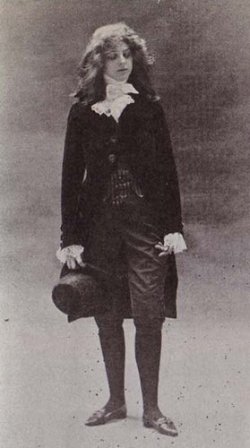
Renée Vivien
(1877–1909)
The Touch
The trees have kept some lingering sun in their branches,
Veiled like a woman, evoking another time,
The twilight passes, weeping. My fingers climb,
Trembling, provocative, the line of your haunches.
My ingenious fingers wait when they have found
The petal flesh beneath the robe they part.
How curious, complex, the touch, this subtle art—
As the dream of fragrance, the miracle of sound.
I follow slowly the graceful contours of your hips,
The curves of your shoulders, your neck, your unappeased breasts.
In your white voluptuousness my desire rests,
Swooning, refusing itself the kisses of your lips.
Renée Vivien poetry
fleursdumal.nl magazine
More in: Archive U-V, Renée Vivien, Vivien, Renée
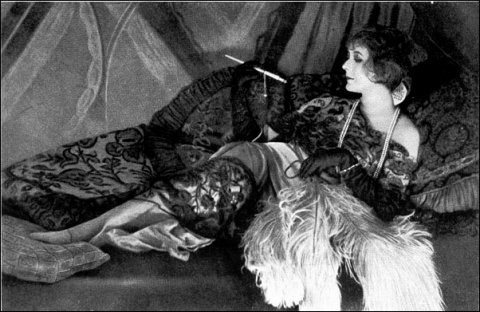
A n i t a B e r b e r
Gedicht für Sebastian Droste
I c h
Wachs schimmerndes Wachs
Ein Kopf – ein Brokatmantel
Wachs –
Rot – wie Kupfer so rot und lebende Haare
Funkelnde Haare wie heilige Schlangen und Flammen
Tot
Millionenmal tot
Verwest
Und schön – so schön
Blut wie fliessendes Blut
Ein Mund stumm
Nacht ohne Sterne und Mond
Die Lider – so schwer
Schnee wie kalter wärmende Schnee
Ein Hals – und fünf Finger wie Blut
Wachs wie Kerzen
Ein Opfer von ihm

S e b a s t i a n D r o s t e
Gedicht für Anita Berber
Tanz Anita zu eigen
Aufwirbelndes jauchzendes Begehren
Sprung – – –
Webenden Wellen
Weichwelle Wogen
Kreist kreist unendliche Kreise – – –
Verlangendes Weben schwebt wellwoges Wogen
Auf einsamen Thronen thront der Gott – –
Sturzwelles spitzes grelles Begehren
Kreisgelles gelbgrünes Belachen
Zerkreisen zerwellen zerwogen zerhauchen
Springpflanzartiges Zerblättern
Beschwingen
Besingen
Klang –
Aufjublendes Zerfliessen
Zergreifen
Zerweben – –
Tanz – – –
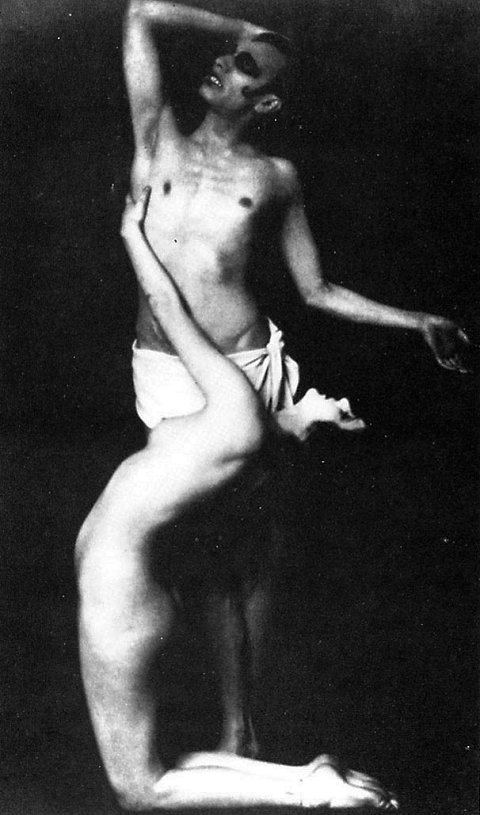
Anita Berber (1899-1928)
& Sebastian Droste (1892-1927):
2 Gedichte
fleursdumal.nl magazine
More in: Anita Berber, Anita Berber, Berber, Anita, DANCE & PERFORMANCE
.jpg)
Amy Levy
(1861-1889)
A Farewell
(After Heine.)
The sad rain falls from Heaven,
A sad bird pipes and sings ;
I am sitting here at my window
And watching the spires of “King’s.”
O fairest of all fair places,
Sweetest of all sweet towns!
With the birds, and the greyness and greenness,
And the men in caps and gowns.
All they that dwell within thee,
To leave are ever loth,
For one man gets friends, and another
Gets honour, and one gets both.
The sad rain falls from Heaven;
My heart is great with woe–
I have neither a friend nor honour,
Yet I am sorry to go.
Amy Levy poetry
fleursdumal.nl magazine
.jpg)
Novalis
(Friedrich von Hardenberg, 1772–1802)
Hymnen an die Nacht 4
Nun weiß ich, wenn der letzte Morgen seyn wird – wenn das Licht nicht mehr die Nacht und die Liebe scheucht – wenn der Schlummer ewig und nur Ein unerschöpflicher Traum seyn wird. Himmlische Müdigkeit fühl ich in mir. – Weit und ermüdend ward mir die Wallfahrt zum heiligen Grabe, drückend das Kreutz. Die krystallene Woge, die gemeinen Sinnen unvernehmlich, in des Hügels dunkeln Schooß quillt, an dessen Fuß die irdische Flut bricht, wer sie gekostet, wer oben stand auf dem Grenzgebürge der Welt, und hinübersah in das neue Land, in der Nacht Wohnsitz – warlich der kehrt nicht in das Treiben der Welt zurück, in das Land, wo das Licht in ewiger Unruh hauset.
Oben baut er sich Hütten, Hütten des Friedens, sehnt sich und liebt, schaut hinüber, bis die willkommenste aller Stunden hinunter ihn in den Brunnen der Quelle zieht – das Irdische schwimmt obenauf, wird von Stürmen zurückgeführt, aber was heilig durch der Liebe Berührung ward, rinnt aufgelöst in verborgenen Gängen auf das jenseitige Gebiet, wo es, wie Düfte, sich mit entschlummerten Lieben mischt.
Noch weckst du, muntres Licht den Müden zur Arbeit – flößest fröhliches Leben mir ein – aber du lockst mich von der Erinnerung moosigem Denkmal nicht. Gern will ich die fleißigen Hände rühren, überall umschaun, wo du mich brauchst – rühmen deines Glanzes volle Pracht – unverdroßen verfolgen deines künstlichen Werks schönen Zusammenhang – gern betrachten deiner gewaltigen, leuchtenden Uhr sinnvollen Gang – ergründen der Kräfte Ebenmaß und die Regeln des Wunderspiels unzähliger Räume und ihrer Zeiten. Aber getreu der Nacht bleibt mein geheimes Herz, und der schaffenden Liebe, ihrer Tochter. Kannst du mir zeigen ein ewig treues Herz? hat deine Sonne freundliche Augen, die mich erkennen? fassen deine Sterne meine verlangende Hand? Geben mir wieder den zärtlichen Druck und das kosende Wort? Hast du mit Farben und leichtem Umriß Sie geziert – oder war Sie es, die deinem Schmuck höhere, liebere Bedeutung gab? Welche Wollust, welchen Genuß bietet dein Leben, die aufwögen des Todes Entzückungen? Trägt nicht alles, was uns begeistert, die Farbe der Nacht? Sie trägt dich mütterlich und ihr verdankst du all deine Herrlichkeit. Du verflögst in dir selbst – in endlosen Raum zergingst du, wenn sie dich nicht hielte, dich nicht bände, daß du warm würdest und flammend die Welt zeugtest. Warlich ich war, eh du warst – die Mutter schickte mit meinen Geschwistern mich, zu bewohnen deine Welt, sie zu heiligen mit Liebe, daß sie ein ewig angeschautes Denkmal werde – zu bepflanzen sie mit unverwelklichen Blumen. Noch reiften sie nicht diese göttlichen Gedanken – Noch sind der Spuren unserer Offenbarung wenig – Einst zeigt deine Uhr das Ende der Zeit, wenn du wirst wie unser einer, und voll Sehnsucht und Inbrunst auslöschest und stirbst. In mir fühl ich deiner Geschäftigkeit Ende – himmlische Freyheit, selige Rückkehr. In wilden Schmerzen erkenn ich deine Entfernung von unsrer Heymath, deinen Widerstand gegen den alten, herrlichen Himmel. Deine Wuth und dein Toben ist vergebens. Unverbrennlich steht das Kreutz – eine Siegesfahne unsers Geschlechts.
Hinüber wall ich,
Und jede Pein
Wird einst ein Stachel
Der Wollust seyn.
Noch wenig Zeiten,
So bin ich los,
Und liege trunken
Der Lieb’ im Schooß.
Unendliches Leben
Wogt mächtig in mir
Ich schaue von oben
Herunter nach dir.
An jenem Hügel
Verlischt dein Glanz –
Ein Schatten bringet
Den kühlenden Kranz.
O! sauge, Geliebter,
Gewaltig mich an,
Daß ich entschlummern
Und lieben kann.
Ich fühle des Todes
Verjüngende Flut,
Zu Balsam und Aether
Verwandelt mein Blut –
Ich lebe bey Tage
Voll Glauben und Muth
Und sterbe die Nächte
In heiliger Glut.
![]()
Novalis poetry
fleursdumal.nl magazine
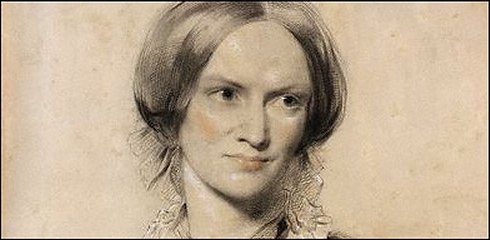
Charlotte Brontë
(1816 -1855)
The Wife’s Will
Sit still–a word–a breath may break
(As light airs stir a sleeping lake)
The glassy calm that soothes my woes–
The sweet, the deep, the full repose.
O leave me not! for ever be
Thus, more than life itself to me!
Yes, close beside thee let me kneel–
Give me thy hand, that I may feel
The friend so true–so tried–so dear,
My heart’s own chosen–indeed is near;
And check me not–this hour divine
Belongs to me–is fully mine.
‘Tis thy own hearth thou sitt’st beside,
After long absence–wandering wide;
‘Tis thy own wife reads in thine eyes
A promise clear of stormless skies;
For faith and true love light the rays
Which shine responsive to her gaze.
Ay,–well that single tear may fall;
Ten thousand might mine eyes recall,
Which from their lids ran blinding fast,
In hours of grief, yet scarcely past;
Well mayst thou speak of love to me,
For, oh! most truly–I love thee!
Yet smile–for we are happy now.
Whence, then, that sadness on thy brow?
What sayst thou? “We muse once again,
Ere long, be severed by the main!”
I knew not this–I deemed no more
Thy step would err from Britain’s shore.
“Duty commands!” ‘Tis true–’tis just;
Thy slightest word I wholly trust,
Nor by request, nor faintest sigh,
Would I to turn thy purpose try;
But, William, hear my solemn vow–
Hear and confirm!–with thee I go.
“Distance and suffering,” didst thou say?
“Danger by night, and toil by day?”
Oh, idle words and vain are these;
Hear me! I cross with thee the seas.
Such risk as thou must meet and dare,
I–thy true wife–will duly share.
Passive, at home, I will not pine;
Thy toils, thy perils shall be mine;
Grant this–and be hereafter paid
By a warm heart’s devoted aid:
‘Tis granted–with that yielding kiss,
Entered my soul unmingled bliss.
Thanks, William, thanks! thy love has joy,
Pure, undefiled with base alloy;
‘Tis not a passion, false and blind,
Inspires, enchains, absorbs my mind;
Worthy, I feel, art thou to be
Loved with my perfect energy.
This evening now shall sweetly flow,
Lit by our clear fire’s happy glow;
And parting’s peace-embittering fear,
Is warned our hearts to come not near;
For fate admits my soul’s decree,
In bliss or bale–to go with thee!
.jpg)
Currer Bell (Charlotte Brontë) poetry
fleursdumal.nl magazine
More in: - Archive Tombeau de la jeunesse, Anne, Emily & Charlotte Brontë, Archive A-B, Brontë, Anne, Emily & Charlotte
Thank you for reading Fleurs du Mal - magazine for art & literature